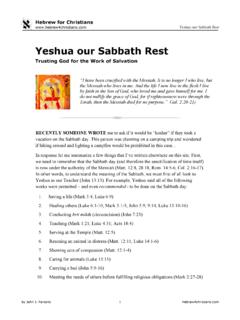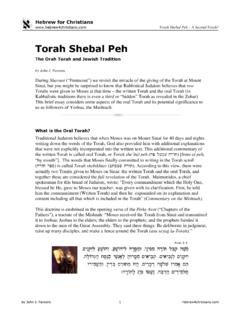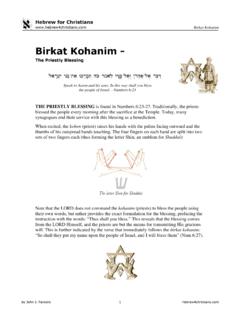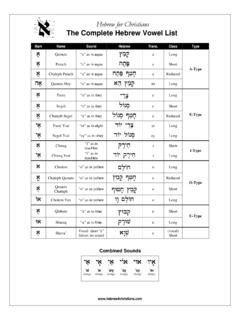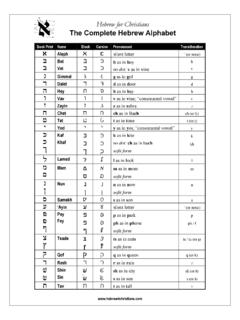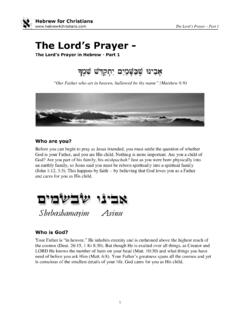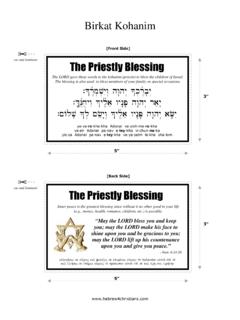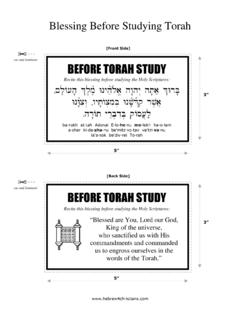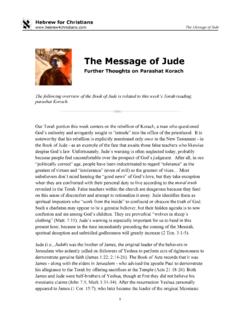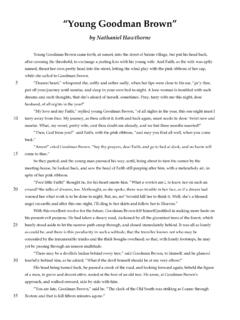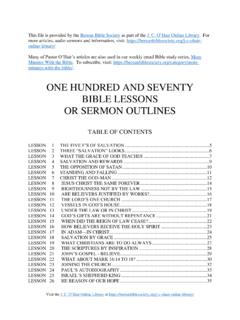Transcription of The Jewish Calendar - hebrew4christians.com
1 Hebrew for Christians The Jewish Calendar The Jewish Calendar - Mindfulness of the Divine Rhythm To every thing there is a season, and a time to every purpose under the heaven (Eccl 3:1). Introduction The very first word of the Torah indicates the awareness of the significance of time - in the (Genesis 1:1), and according to Rabbinic tradition, the very first commandment given to the children of Israel after being delivered from Egypt was to sanctify the New Moon (Exodus 12:1-2), thereby causing the fledgling nation to depart from the solar tradition of the Egyptians (Ra worship) and to look to the moon for a new means of reckoning time and seasons.
2 The Hebrew lunar Calendar is set differently than the solar Calendar . The day begins at sundown; the climactic day of the week is Shabbat - the seventh day of the week; the moon and its phases in the night sky are the timepiece for the months, and the seasons of the year are marked with special festivals or mo'edim (appointed times). Even the years are numbered: every seventh year was sh'mitah - a Sabbatical year (Lev. 25:2-5), and after seven cycles of sh'mitah the Yovel, or Jubilee Year was to be observed (Lev.)
3 25:8-17). Indeed, according to the Jewish sages, the history of the world may be understood as seven 1,000 year days, corresponding to the seven days of creation. In fact, the Talmud (Avodah Zarah, 9A) states that the olam hazeh (this world) will only exist for six thousand years, while the seventh millennium will be an era of worldwide shalom called the olam haba (world to come). A Luni-Solar Seasonal Calendar Actually, the Jewish Calendar might best be described as luni-solar. Since every lunar cycle runs roughly days, the Jewish year has 354 days compared to 365 days of the solar Calendar .
4 To ensure that the festivals would occur in their proper seasons ( Passover in springtime, Sukkot in the fall, etc.), an extra month (Adar II) is added every two or three years to offset the 11 day lag per solar year. In this way the lunar Calendar is synchronized with the solar cycle of the agricultural seasons. by John J. Parsons 1 Hebrew for Christians The Jewish Calendar The western sense of time is basically the measurement of linear, progressive motion, but in Hebrew thinking, time is seen as an ascending helix, with recurring patterns or cycles that present a thematic message or revelation of sacred history.
5 Indeed, part of being a Jew today is to be mindful of this divinely ordered spiral of time and to order our affairs accordingly. The Jewish Day The Hebrew day (yom) begins at sundown, when three stars become visible in the sky (the rabbis reasoned that the day begins at sunset based on the description of God's activity in creation, and the evening and the morning were the first day, Genesis 1:5). Evening is sometimes defined as the late afternoon, that is, between 3:00 pm to sundown. Since the Jewish day (yom) begins at sundown, you must remember that a Jewish holiday actually begins on the night before the day listed in a Jewish Calendar .
6 For example, Yom HaShoah (Holocaust Memorial Day) occurs on Nisan 27, which actually begins after sundown, Nisan 26: Thus a given Jewish holiday spans two days on our Gregorian Calendar . Most Jewish calendars do not indicate the previous night as part of the holiday. Observance of a holiday begins at sundown on the day before it is listed in the Calendar ! In the example above, Yom HaShoah is observed both on Thursday the 5th (after sundown) and Friday the 6th (during daylight hours). Note that if a Jewish holiday were to occur on a Sabbath, it would be moved to the previous Thursday on the Calendar .
7 For example, if Nisan 27 happened to begin on Friday at sundown, it would be moved to Nisan 26. Accessing a current Jewish Calendar is essential to observing the mo'edim! A Note about the Jewish hour (sha'ah). In rabbinical thinking, the hour is calculated by taking the total time of daylight (from sunrise until sunset). of a particular day and dividing it into 12 equal parts (this is called sha'ah zemanit, or a proportional hour ). Since the duration of daylight varies according to seasons of the year, a proportionate hour will vary by season.
8 The sixth hour of the day does not mean 6:00 or even six 60 minute hours after sunrise, but is the 6th proportionate hour of the 12 that are counted for the day in question. For example, if the sun rises at 4:30 and sets at 7:30 , the total time of daylight is 15 hours. 15. hours * 60 minutes is 900, which divided by 12 yields a proportional hour of 75 minutes. The sixth hour of the day therefore begins 450 minutes after sunrise, or about 11:30 in the morning. The calculation of zemanim ( times ) are important for the observance of Jewish holidays and Sabbath candle lighting hours.
9 The results will vary depending on the length of the daylight hours in the particular location. Note, however, that the hour is not counted from sunset (as might be expected), but from sunrise. by John J. Parsons 2 Hebrew for Christians The Jewish Calendar The Jewish Week The Jewish week (shavu'a) begins on Sunday and ends on Shabbat: The Importance of Shabbat The fourth of the ten mitzvot (commandments) is, Remember the Sabbath day, to keep it holy (Ex. 20:8, KJV). Shabbat is therefore considered to be the most important day of the week, since its observance is explicitly set forth as one of the Ten Commandments.
10 In fact, Shabbat is considered the most important of the Jewish Holidays, even more important than Rosh HaShanah and Yom Kippur! During Shabbat, no work (defined under 39 main categories associated with the building of the Tabernacle in the desert) is to be performed, since this would violate the idea of rest (shabbaton) that is to mark the day. Weekly Torah Readings Weekly Torah readings are divided into 54 sections. A given weekly section is called a parashah (pl. parashiyot) and is read during a synagogue service.
